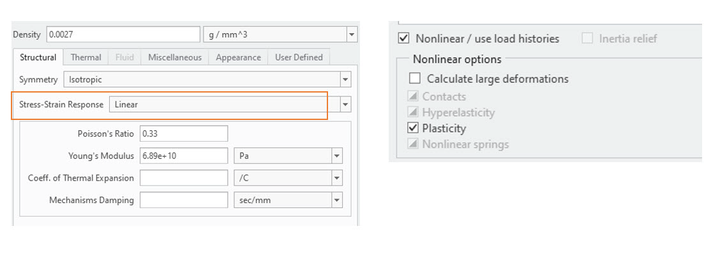Community Tip - Have a PTC product question you need answered fast? Chances are someone has asked it before. Learn about the community search. X
- Community
- Creo+ and Creo Parametric
- Analysis
- Re: The gray area between linear and nonlinear for...
- Subscribe to RSS Feed
- Mark Topic as New
- Mark Topic as Read
- Float this Topic for Current User
- Bookmark
- Subscribe
- Mute
- Printer Friendly Page
The gray area between linear and nonlinear for static simulation
- Mark as New
- Bookmark
- Subscribe
- Mute
- Subscribe to RSS Feed
- Permalink
- Notify Moderator
The gray area between linear and nonlinear for static simulation
When the stress-strain response of the material is defined as "Linear"; under what conditions one must activate the "plasticity" for the simulation.
Static simulations with linear material responses are considered "small deformation" theory.
If plasticity or large deformation does not exist when using linear material responses, why not black out this function.
Solved! Go to Solution.
- Labels:
-
Simulate
Accepted Solutions
- Mark as New
- Bookmark
- Subscribe
- Mute
- Subscribe to RSS Feed
- Permalink
- Notify Moderator
@skunks Thank you for the presentation material. I need time to figure out the theory.
- Mark as New
- Bookmark
- Subscribe
- Mute
- Subscribe to RSS Feed
- Permalink
- Notify Moderator
we use the plasticity for the calculation of the plastic collapse
- Mark as New
- Bookmark
- Subscribe
- Mute
- Subscribe to RSS Feed
- Permalink
- Notify Moderator
Thank you very much for your reply and interest in this topic.
Is this case done by using the "Elastoplastic" in the "Stress-strain response" definition of the material settings?
- Mark as New
- Bookmark
- Subscribe
- Mute
- Subscribe to RSS Feed
- Permalink
- Notify Moderator
- Mark as New
- Bookmark
- Subscribe
- Mute
- Subscribe to RSS Feed
- Permalink
- Notify Moderator
Thanks again for your help.
In Creo Simulate, when we perform a simulation where the maximum stress exceeds the yield point. In this case, we will apply "Elastoplastic" to the stress-strain response of the material definition. At the same time, "Large deformation" and "Plasticity" in the nonlinear options are automatically checked. With this setup, we may get a result that is close to the real world situation.
Conversely, in a linear material circumstance, the "nonlinear option" in the Analysis Definition is still available. Therefore, I was wondering what kind of situation would use the nonlinear options. If not, why not to block these functionlity.
- Mark as New
- Bookmark
- Subscribe
- Mute
- Subscribe to RSS Feed
- Permalink
- Notify Moderator
- a linear material and large deformations (often)
- a linear material and contacts (very often)
- Mark as New
- Bookmark
- Subscribe
- Mute
- Subscribe to RSS Feed
- Permalink
- Notify Moderator
- Mark as New
- Bookmark
- Subscribe
- Mute
- Subscribe to RSS Feed
- Permalink
- Notify Moderator
- Mark as New
- Bookmark
- Subscribe
- Mute
- Subscribe to RSS Feed
- Permalink
- Notify Moderator
Thank you for this reply and video skunks but I am still looking for another solution because these suggestions aren't quite working.
- Mark as New
- Bookmark
- Subscribe
- Mute
- Subscribe to RSS Feed
- Permalink
- Notify Moderator
- Mark as New
- Bookmark
- Subscribe
- Mute
- Subscribe to RSS Feed
- Permalink
- Notify Moderator
@skunks Thank you for the presentation material. I need time to figure out the theory.






